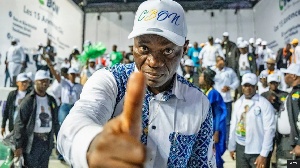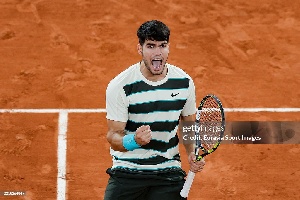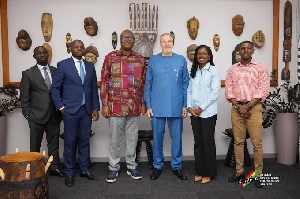- Home - News
- Elections 2024
- News Archive
- Crime & Punishment
- Politics
- Regional
- Editorial
- Health
- Ghanaians Abroad
- Tabloid
- Africa
- Religion
- Photo Archives
- Press Release
General News of Thursday, 10 April 2025
Source: www.ghanawebbers.com
Why Gabon’s coup leader is bucking a trend by embracing democracy
A little over 19 months after a coup, Gabon is heading to the polls. This coup ended more than five decades of Bongo family rule. Unlike military leaders in other African nations, Gabon’s military is stepping back from power.
Brice Clotaire Oligui Nguema led the peaceful coup and is the favorite. He has traded his military uniform for a politician's suit. Oligui Nguema faces seven other candidates in the election on Saturday. His popularity stems from relief at ending dynastic rule.
His campaign slogan, “C’BON,” plays on French words meaning “it’s good.” He aims to win outright in the first round. His main challenger is Alain-Claude Bilie-By-Nze, the last prime minister of the old regime.
Victory would grant him a seven-year mandate to implement reforms. Gabon has 2.5 million people and is rich in oil and manganese. The country also boasts some of the most biodiverse areas of rainforest.
Gabon has mostly enjoyed calm since its independence, unlike many neighbors. Oligui Nguema seized power on August 30, 2023, without resistance. This happened just hours after authorities announced Ali Bongo Ondimba won re-election with 64% of votes.
Many found this official result hard to believe. Ali Bongo had narrowly won a disputed election in 2016. After suffering a stroke while abroad, he faced public sympathy during recovery. However, resentment grew when he sought a third term despite his health issues.
The military intervened peacefully to end Bongo's regime and arrested key figures. This action sparked celebrations among Gabonese tired of dynastic rule. Even political elites welcomed the coup as a chance for change.
Oligui Nguema built broad support by including former opponents in government roles. Political detainees were released, but Ali Bongo's family remains detained on corruption charges. Unlike other military leaders in Africa, he did not crack down on dissent or media freedom.
On the diplomatic front, Oligui Nguema seeks goodwill with international partners. Relations with France are warm; they recently agreed to transform a French base into a training center together.
He has responded to public demand for change by accelerating development projects. His government acquired assets from foreign oil companies like Tullow Oil to boost national interests.
To manage finances better, he borrowed from regional markets and raised $520 million through Eurobonds in February. Much of this money paid off old debts while setting aside funds for World Bank arrears.
If elected head of state on Saturday, Oligui Nguema will face significant challenges ahead. The transition period was relatively easy due to public support for change.
There was consensus about banning dynastic succession in the new constitution. However, abolishing the prime minister position concentrated power solely in his hands.
Prominent figures like Alexandre Barro-Chambrier have joined his administration and may play key roles post-election. Yet all eyes will be on Oligui Nguema as he navigates complex challenges ahead.
Gabon aims to lead in rainforest conservation while balancing economic pressures from natural resources extraction. Urban populations need jobs and services amid disappointing social development records despite relative wealth.
Trade unionist Jean Rémy Yama could voice popular frustrations after being excluded from running due to paperwork issues related to his father’s birth certificate requirement.
For Oligui Nguema, the hardest work is just beginning.











